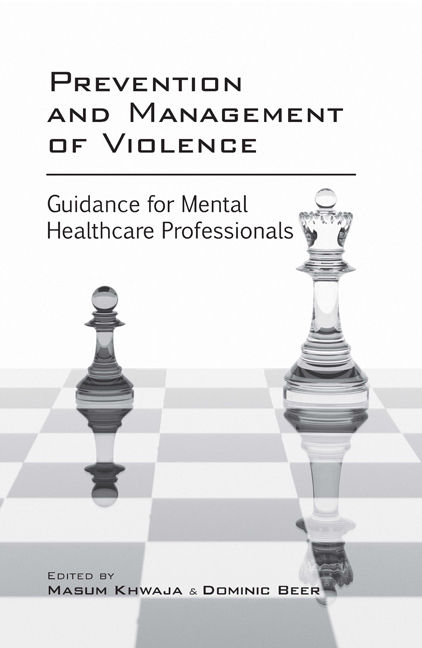Book contents
- Frontmatter
- Dedication
- Contents
- Abbreviations
- List of boxes and tables
- Working group
- Executive summary and recommendations
- 1 Legislation relevant to the management of violence by persons with mental disorders
- 2 Safeguarding vulnerable adults and children exposed to violence
- 3 Risk assessment and management
- 4 Risk prevention and non-pharmacological management of violence in acute settings
- 5 Use of medication and ECT in the management of violence
- 6 Post-incident management
- 7 Management of the risk of violence in the community
- 8 Management of violence in older adults
- 9 Management of violence in people with intellectual disability
- 10 Management of violence in prisons
- 11 Liaison with the police, Crown Prosecution Service and MAPPA
- 12 Information-sharing with victims of crime committed by persons with mental disorders
- 13 Clinical governance
- Appendix Organisations that victims of crime can contact
- Index
8 - Management of violence in older adults
- Frontmatter
- Dedication
- Contents
- Abbreviations
- List of boxes and tables
- Working group
- Executive summary and recommendations
- 1 Legislation relevant to the management of violence by persons with mental disorders
- 2 Safeguarding vulnerable adults and children exposed to violence
- 3 Risk assessment and management
- 4 Risk prevention and non-pharmacological management of violence in acute settings
- 5 Use of medication and ECT in the management of violence
- 6 Post-incident management
- 7 Management of the risk of violence in the community
- 8 Management of violence in older adults
- 9 Management of violence in people with intellectual disability
- 10 Management of violence in prisons
- 11 Liaison with the police, Crown Prosecution Service and MAPPA
- 12 Information-sharing with victims of crime committed by persons with mental disorders
- 13 Clinical governance
- Appendix Organisations that victims of crime can contact
- Index
Summary
How big is the problem?
Nearly 700 000 people in the UK are thought to have dementia (Knapp & Prince, 2007), making this by far the most prevalent serious mental disorder. Approximately 90% will develop behavioural or psychological symptoms as a result of their dementia, and in about 13% the predominant problem will be physical aggression (Waite et al, 2008: p. 153). Functional psychiatric illnesses may continue with ageing or present for the first time in older adults, but this chapter will concentrate on the management of violence in older people with organic disorders.
The Healthcare Commission's National Audit of Violence 2006–2007 (Healthcare Commission, 2008a,b) included for the first time incidents of violence in hospital services for older people, in addition to those occurring in units for adults of working age. The findings were disturbing but not widely publicised. It appears from the accounts of service users and carers that the quality of nursing being delivered in the hospital wards studied was extremely high, but this was not enough to prevent physical violence being a distressingly frequent event.
• Nurses working in older people's services were more likely to have experienced physical assault (64% had been assaulted) than those employed in services for adults of working age.
• In older people's services, violent incidents were less likely to be precipitated by too rapid use of medication or physical restraint.
• Older people's wards were less well designed and equipped, with poorer sightlines, poorer control of heating and ventilation, and less easy access to resuscitation equipment.
• Alarm systems and training were less satisfactory in older people's units.
• Nursing staff had less influence on admission policy and more difficulties in accessing additional staff in older people's units.
About 500 000 people live in care homes in the UK. Data on care home populations are not routinely collected in the UK, but in Scotland about 90% of care home places (38 341/42 810) are for elderly people (Information Services Division, 2011). Even in homes not specifically registered to provide care for people with mental disorder, the majority of residents have dementia – about 80% of residents of non-specialist homes are thought to have dementia (Knapp & Prince, 2007) – compared with nearly 90% of those in designated specialist EMI (elderly mentally infirm) units.
- Type
- Chapter
- Information
- Prevention and Management of ViolenceGuidance for Mental Health Professionals, pp. 81 - 88Publisher: Royal College of PsychiatristsFirst published in: 2017

